|
|
 |
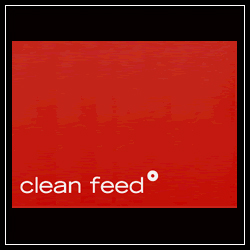
|
 |
Dusted Features
Dusted's Jason Bivens rounds up a load of releases on Portugal's Clean Feed Records.
|
|
|
 |
Clean Feed
Sometimes I think that the Portuguese labels Clean Feed and Creative Sources are having a contest to see who can release the most discs in a single year. Here are some of the highlights from the first part of 2007, though by no means is this everything Clean Feed has to offer.
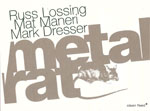
The first thing that might come to mind upon seeing the instrumentation – pianist Russ Lossing, violinist/violist Mat Maneri, and bassist Mark Dresser – on Metal Rat (Clean Feed 064) is Matthew Shipp’s String Trio, a combo in which Maneri’s unique improvisational voice played a central role. Yet pianist Lossing is as different from Shipp as Dresser is from William Parker. He’s far more influenced by impressionistic players like Blake or Bley than by firebrands and cluster-pounders. The disc’s format is somewhat standard format, broken into trios, duos, and solos over the course of about 50 minutes. Generally the level of invention and interaction is very high, and the pieces range from somber ballads like “Turn” (which brings out the greatest creativity amongst these players, with Dresser’s rubbery lines seeming to coax micro-grains from Maneri and Feldman-like obliqueness from Lossing), concise chamber interplay on the title track (graced by some judicious percussive thwacks and spooky echoes), or fractious free noise on “Coming to Meet” (all jangling icicles). In general I prefer the trios, though some of the duos are quite rich (for example, the incisive strings duet “Damp(ness)” and “Dry(ist),” for cascading piano and viola). Fine stuff.
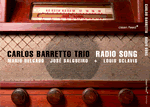
Contrabassist Carlos Barretto’s Radio Song (Clean Feed 072) – his second for the label – is a delight. With drummer/percussionist Jose Salgueiro and high-motor guitarist Mario Delgado, Barretto races through a set of eleven pan-idiomatic themes stuffed with exuberant playing (and on three of these tracks the trio is joined by reeds ace Louis Sclavis). It’s an extremely vibrant, often nicely raucous recording combining nice charts and really pumped up improvising in a way that’s sure to please fans of caffeinated combos like Adam Lane’s No(w) Orchestra, the Vandermark Five, and Exploding Customer, among others. The serpentine “Distresser” is a great opener, with raunchy bass clarinet. “Searching” sounds much more emphatic than its title suggests, coasting on an almost punishing rock groove. The later “Final Searching” sounds like one of those loping Dave Holland tunes from “Extensions” – gnarly and fun. There’s some Big Fun-style funk on “Luminae,” lonely and ominous even as it churns. The fine “O Rapaz” recalls early Frisell, surprisingly enough, in the way Delgado’s choked chords ring and resound (but then he adds a bit of Ducret scrape as a changeup). Barretto is an excellent, muscular player who combines the lyricism of players like Fred Hopkins, Cecil McBee, and Johnny Dyani with an ear for idiomatic references (such as the Afro-pop gloss “Radio Song”). But he’s also a wonderfully sober and accomplished player when his mood dictates this – listen to his gorgeous arco playing on his duo with Sclavis, “On Verra Bien.” A nice surprise.
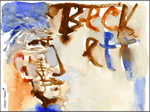
Madison-based guitarist Scott Fields follows up his previous record Mamet with another literary dedication on Beckett (Clean Feed 069). It’s not always so clear how these sources necessarily inform the music, but the music is fine. Here Fields is joined by tenor saxophonist Matthias Schubert, cellist Scott Roller, and percussionist John Hollenbeck. The brief opener “Breath” sets the course for the mammoth “Play” – the rolling, often gauzy improvisations recall older Fields records like Disaster at Sea. But the almost serialist compositional language and the quite detailed unison charts yield another kind of music altogether. It’s pretty intense stuff – I’d like to see the score – but at 20 minutes or so the approach wears a bit thin and don’t go to quite enough places for me. Fields’ preferred strategies turn on unison, craggy pulse-based notated parts – he uses these as fulcra, setting up pauses, sub-groupings, free sections, and so forth. The basic materials are subject to wide variation, as on the slinky, dark corners of “Come and Go.” But there is an underlying structural commonality nonetheless. It’s when you get into the details that you realize this is very subtle music – and when you focus on harmonic shade and nuance, or a joint tugging at a rhythmic knot, you start to hear how it comes alive. Fields’ own playing sounds best on the closing “Rockaby,” taut and densely phrased. Throughout he uses effects judiciously – a bit of bowing here, a daub of distortion there. While some of the long pieces get desultory, there’s more than enough to enjoy here.
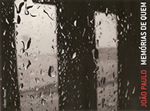
If memory serves, Joao Paulo’s Memorias de Quem (Clean Feed 075) is Clean Feed’s first solo piano recording. He plays with a light touch and a slightly moody disposition, almost like a slightly slowed down (and less maudlin) Jarrett from the 1970s. Most of these pieces are freely improvised, though the pianist does incorporate themes from Jewish and Portuguese vernacular music (don’t expect anything as vigorous as Ran Blake or Anthony Coleman though). He doesn’t often work in the motivic style heard on “Ramagem,” which is a pity since it suits his elaborate imagination better than the chordal depth-plumbing elsewhere. The jumping “Fantasmas” – with a dash of Tristano in the left hand as the right spans some big intervals – is another winner. Also fun is the appropriately title “O Incendio,” filled with racing parallel motion and heavy on the pedals like Borah Bergmann. But there’s just a bit too much sickly sweet sentiment on tunes like “Durme” – I know that thousands of people go wild for this kind of thing, as it’s marketed to suggest that it’s the most personal and deeply felt music of all. But sometimes this music, while its day job is jazz, can be seen doing back alley deals late at night with New Age.
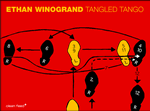
Drummer Ethan Winograd leads a boisterous session on Tangled Tango (Clean Feed 074), along with Gorka Benitez (tenor, soprano, flute), Steven Bernstein (trumpet and slide trumpet), Ross Bonadonna (guitar), Carlos Barretto (bass), and Eric Mingus (additional bass on a pair of tracks). A bit slower and more gauzy than Barretto’s release, there’s a similar kind of feel and a like orientation to groove-based idiomatic music. On tunes like “Broadway Jitters” or the slinky noir “Successions” they sound a bit like the Lounge Lizards or the Jazz Passengers, and fans of those groups should dig into this release. In places Winograd’s music is difficult to resist, as on the gnarly title track (with flute and boisterous slide trumpet), “She’s Flying Gumbo Low” (with a tasty backline groove), and the rocking “Nocturnal Snow.” There are rolling, swinging pulses everywhere and a fine front line (with the saucy Bernstein always adding a bit of flavor). But the album as a whole is a bit too diffuse, with too many different feels and not quite enough group sound for me.
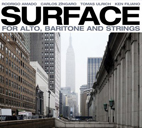
Surface, the second release in Clean Feed’s European Echoes imprint, features – like the first – talented saxophonist Rodrigo Amado (alto and baritone). Unlike its predecessor, a boisterous free-bop session in the spirit of DKV, this disc sets the Portuguese reed-man in the middle of a string trio comprised of Carlos Zingaro (violin and viola), Tomas Ulrich (cello), and Ken Filiano (bass). It’s dark and moody, but filled with moments of grace and buoyancy, that sliver of light making its way into the cellar. The obvious touchstones for me are Kent Carter’s marvelous string trios and Dominic Duval’s String Ensemble (of which Ulrich was also a member, along with saxophonists Joe McPhee and Mark Whitecage). Something about Zingaro’s lyricism brings out a gorgeous, almost ululating quality in this group that recalls some of Gavin Bryars’ more lush writing for strings (“After the Requiem,” say). Not everything is a wafting dark cloud – check the furtive, pointillist “Natural Bridge” or the tart swing of “The City.” The record’s center is the five-part “Surface Suite,” which is relatively brief and condensed but not at the expense of interest or intrigue. Lovely wafting alto over hesitant pizz dance leads to some raucous and sawing groove on the concluding “Art is Truth.” Another fine entry from Amado.
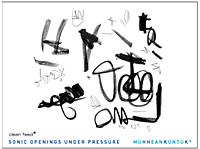
Sonic Openings Under Pressure is the apt moniker chosen by alto saxophonist Patrick Brennan, bassist Hilliard Greene, and David Pleasant (credited with an amalgam of percussion, harmonica, and voice referred to as densemetriX). Their sophomore release is called Muhheankuntuk (Clean Feed 081), or River that flows two ways. Most listeners hear Brennan’s playing and think quickly of Ornette or Lyons. Sure, that’s accurate. But there’s also this really intensely subtle rhythmic sensibility that reminds me of a cross between the late Thomas Chapin’s darting angularity and patient architecture of Rob Brown. It’s a style that works really well with the kind of dense interlocking cell structures that Greene and Pleasant whip up on tunes like “Tilting Curvaceous.” On a lot of these tunes (like the intensely rolling “Abundant”), Greene sets up a wide-open pulse that recalls some of William Parker’s intervals or arpeggiating. On top Pleasant rolls and piles up (often with sweet timbres that recalls Paul Lovens), while Brennan inspects and dissects motives very interestingly. The standout track is “The Terrible,” though I also really dig the warbling lyricism, sour blues, and haunted abstraction on “Flash of the Spirit” (I should also say that the vocal “rap” on “Hardships” is entirely forgettable).
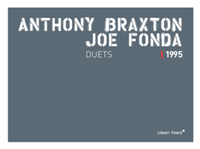
Duets 1995 (Clean Feed 079) is a reissue of a Konnex disc featuring the indefatigable Anthony Braxton on reeds and one of his bassists of choice during the 1990s, Joe Fonda. Typical for the period, Braxton includes a couple of standards (“All of You” and “Autumn in New York”) to go along with his own pieces (136, 168+147, and 173) and several of Fonda’s. Fonda’s always exuberant, his rubbery lines an equal partner to Braxton’s own quirky perambulating. But there’s something patient and purposeful about these performances, even on Fonda’s jumpy, interval-happy “Relentlessness” (with some sly references to other pieces in the Braxton canon) or the harsh overblowing and arco on “Out of the Cage.” I actually don’t have any other examples of Compositions 168 or 147, so I can’t cross-checked the duo readings here. But it’s vintage late 1980s/early 1990s Braxton, combining some of the pulse track and language series into a newly textural approach (that foreshadows some of his current explorations). Some of the finest moments are lyrical – the beautiful serpentine clarinet that winds its way through tough double-stops on “Something from the Past” – and some are structural, as with the stutter-step pointillism on the mighty 136, leading into an intense 173 (with some gnarly detuned Fonda and closing contrabass clarinet madness). Yet another fine date from the master.
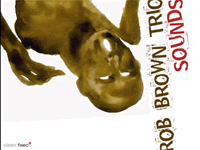
Dynamite alto saxophonist Rob Brown is back in the house with a new trio on Sounds (Clean Feed 077). Here he’s joined by the fab cellist Daniel Levin (with whom Brown has recorded some fine dates under Levin’s name) and the resourceful percussionist Satoshi Takeishi. While Brown’s language on the saxophone is increasingly distinct and rich (an amalgam of some of Jimmy Lyons’ phrasing and Jackie McLean’s timbres), the timbres and the spaciousness of this date clearly hearken back to the late, lamented Julius Hemphill’s sessions with Abdul Wadud (particularly Raw Materials and Residuals). Levin sounds more rambunctious here than on some of his more chamber-oriented recordings for Hatology and Riti – he explores technique wonderfully in a number of duo exchanges with Takeishi throughout, and even when he’s holding down some pulse or doubling Brown’s lines he’s far from an accompanist. Ditto for the percussionist, whose allsorts kit gives this music a range of colors you wouldn’t normally find from a conventional kit. The three-part title suite is fabulous, particularly “Antics,” a scalar frolic where Brown’s intervallic constructions pinwheel and lever around Levin’s riff. There’s similar energy on “Stutter Step,” but the second half of the disc moves into more spacious territory: the excellent lyrical invention on “Tibetan Folk Song,” the Hemphill-derived abstraction of “Sinew,” and the gorgeous concluding ballad “Moment of Pause.” Brown is in the zone these days, and this disc is top shelf.
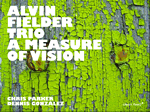
New Orleans drummer Alvin Fielder leads a cracking trio on A Measure of Vision (Clean Feed 071), joined by pianist Chris Parker and dynamite trumpeter Dennis González (whose sons, bassist Aaron and percussionist Stefan, are along for a couple tracks). Fielder’s rolling style, filled with space and rests, creates an interesting foundation for the contrasting styles of Parker (dark, dense, jabbing) and González (open, bright, lyrical). Far from your average free blowing session, there’s a ton of space in this music, even as it crackles with urgency. The rich group sound yields a tight, well-paced session that’s filled with visceral delights and some real surprises to boot. For example, am I wrong to hear the playful “A Mon Frere” as a Bacharach-like miniature? Regardless of its inspiration, it’s a lyrical treat. Equally good are the rolling, Trane-like “Camel” (with ripe bass from Aaron G); “Max-Well” no doubt a tribute to Roach (although I hear more Blackwell to be honest, almost like a lost track from El Corazon); and the rousing “Ripe for Vision,” a harmonically rich free swing piece, with Stefan G’s vibes providing some contrast and some wonderfully exuberant work from Parker. But perhaps the finest moments are heard on “Time No Time” (a simple cell structure becomes an epic, folded and unfolded, dissected and reassembled), “You Old Men Shall Dream Dreams” (with a gorgeous melodic core – and can any trumpet player so consistently spool out phrase after phrase of beautifully constructed lines, all with a tone to die for, like González can?), and the concluding rendition of González’ wonderful (and wonderfully titled) “The Cecil Taylor-Sunny Murray Dancing Lesson.” A strong record.
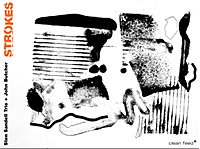
Veteran Swedish pianist Sten Sandell has long been a favorite for his playing in the exuberant Gush. His own trio – with bassist Johann Berthling and percussionist Paal Nilssen-Love – has been coming on strong of late. On Strokes (Clean Feed 082) they’re joined for an April 2006 concert by sax wizard John Butcher (who, in addition to tenor and soprano, busts out his amp for some saxophone feedback). The probing, prodding intro to “Study” sees the musicians making somewhat familiar gestures but slowly supplementing them with techniques generally used in electronic improvising. I love the general reserve of the opening sections, the wonderful interplay in the trio – each playing both percussively and melodically, shapes and blocks of sound rearranging themselves in space. Butcher responds to the shift into higher gear with some deft feedback, blending with Berthling’s big tone. Sandell’s electronics (he also sings here) are more caustic and old-school, but before the eruptions blow the whole thing up, we suddenly find ourselves in a superb pared-down section for soft slap-tonguing and arco. “Unsteady” moves about as far away from the opener as possible for its opening. Over several minutes of tightly focused near-silence, the micro-sound is very detailed, incandescent at times. Capped off by a brief, punchy closer – “Steady” – this is a lively, inventive concert.
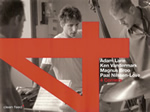
Perhaps the best of the bunch is 4 Corners (Clean Feed 076), a sizzling live date featuring Ken Vandermark (baritone sax, clarinet, and bass clarinet), Magnus Broo (trumpet), Adam Lane (bass), and Paal Nilssen-Love (drums). From the opening moment, you’re immediately envious of the folks who attended these concerts. The group’s music is big and full of life, jumping with multiple rhythms and soaring, hot melodies. You want burning tunes? Check out Lane’s “Spin with the EARth,” a piece he usually performs with his large ensemble but which he expertly adapts for the killer players here – it bounces along merrily, with a fine bass clarinet turn from Vandermark. Maybe you prefer open improvising heat. Then just listen to Broo in full flight on “Alfama (for Georges Bracque),” as he soars over the stomping riff for distorted bass and bass clarinet, or Lane’s intense arco on the gorgeously dark ballad “Lucia.” There’s tasty timbral contrast everywhere (not least between bari and trumpet on “Short Stop,” a dedication to Bobby Bradford) and fantastic riffs every (like the metal breakdown during “Ashcan Rantings” and the tempo mashing on the closing “ChiChi Rides the Tiger”). A glorious reminder of jazz’s power and beauty.
By Jason Bivins
|







